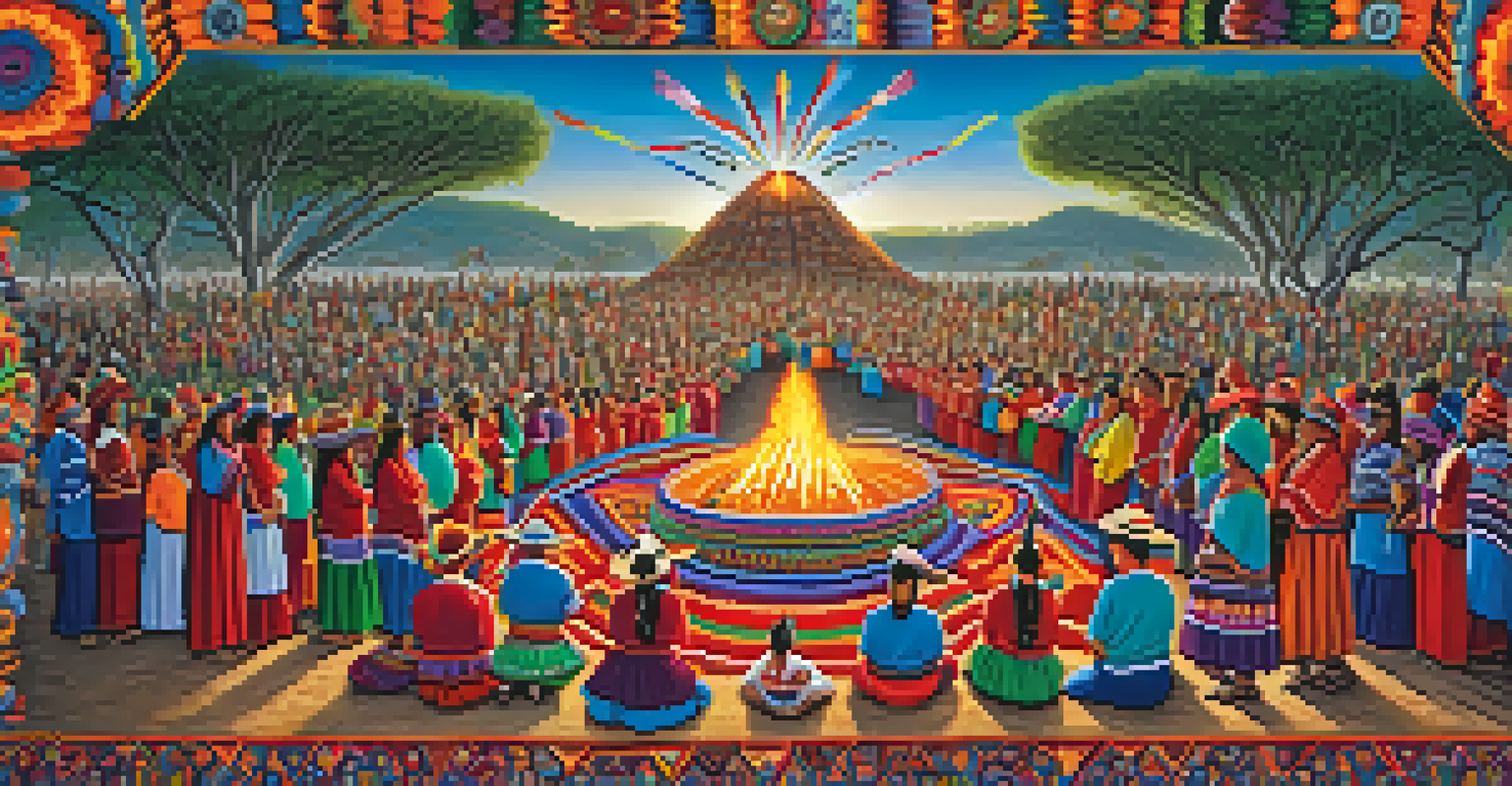Entheogens as Tools for Cultural Resilience

Understanding Entheogens and Their Role in Cultures
Entheogens are substances, often derived from plants, that induce altered states of consciousness, typically for spiritual or shamanic purposes. Many cultures have used these natural compounds for centuries, tapping into their potential to foster mystical experiences. By connecting individuals to a deeper sense of self and community, entheogens play a crucial part in cultural identity and resilience.
The use of entheogens can be a powerful tool for personal transformation, fostering a deeper understanding of oneself and one's place in the universe.
For instance, indigenous peoples in the Amazon have long utilized ayahuasca as a tool for healing and connection. This powerful brew not only facilitates personal insights but also strengthens communal bonds through shared experiences. As these practices continue to be passed down through generations, they contribute to the cultural fabric that supports resilience in the face of modern challenges.
Moreover, the resurgence of interest in entheogens in contemporary society highlights their relevance today. As we navigate a rapidly changing world, these ancient tools can provide valuable insights into collective healing and cultural continuity.
The Science Behind Entheogens and Cultural Healing
Research indicates that entheogens can significantly impact mental health, promoting healing through altered states of consciousness. When individuals engage with these substances in a supportive context, they often report profound insights and emotional release. This therapeutic potential is particularly relevant in cultures facing trauma, where traditional healing methods may prove insufficient.

For example, studies on psilocybin, the active compound in magic mushrooms, have shown promising results for treating depression and PTSD. These findings underscore the importance of integrating traditional practices with modern therapeutic approaches. By doing so, we can create a holistic framework for cultural resilience that honors both ancient wisdom and current scientific understanding.
Entheogens Foster Cultural Resilience
Entheogens, used in traditional practices, help communities maintain their cultural identity and adapt to modern challenges.
Additionally, the communal aspect of using entheogens can foster a sense of belonging and support. Participating in rituals or ceremonies helps individuals feel connected not just to the earth but also to each other, reinforcing social bonds that are vital in maintaining cultural integrity.
Cultural Resilience: A Definition and Its Importance
Cultural resilience refers to the ability of a community to adapt and thrive amidst challenges while preserving its identity and values. This concept becomes especially pertinent in today's globalized world, where cultural homogenization threatens unique traditions. By fostering resilience, communities can maintain their heritage and pass it on to future generations.
In the midst of cultural homogenization, it is vital to preserve the unique traditions that give communities their identity and strength.
Entheogens contribute to this resilience by serving as catalysts for cultural practices that reinforce identity. For example, traditional ceremonies involving these substances often incorporate storytelling, music, and dance, all of which are vital for cultural expression. As these practices endure, they create a rich tapestry of shared experiences that strengthen community ties.
Ultimately, cultural resilience is about more than survival; it's about flourishing. By embracing tools like entheogens, communities can reconnect with their roots while navigating modern challenges, ensuring their cultural legacy endures.
Case Studies: Successful Use of Entheogens
Several communities around the world have successfully integrated entheogens into their cultural practices, showcasing their potential for resilience. One notable example is the Huichol people of Mexico, who use peyote in religious ceremonies. This ritual not only serves as a spiritual guide but also fosters a sense of unity among participants, helping preserve their culture against external pressures.
Similarly, the Santo Daime and União do Vegetal churches in Brazil incorporate ayahuasca in their spiritual practices. These organizations have created safe spaces for individuals to explore their spirituality while promoting cultural identity. Their approach emphasizes inclusivity and community support, illustrating how entheogens can be harnessed for collective healing.
Therapeutic Potential of Entheogens
Research shows that entheogens can promote healing and emotional release, particularly in cultures facing trauma.
These case studies highlight the adaptability of entheogens within various cultural contexts. As communities continue to face modern challenges, these practices can serve as invaluable tools for maintaining cultural integrity and resilience.
Modern Adaptations: Entheogens in Contemporary Society
As society evolves, so do the ways we integrate entheogens into our lives. Today, many individuals seek out these substances not just for spiritual reasons but also for personal growth and healing. This modern adaptation reflects a broader understanding of mental health and wellness, where traditional practices can complement contemporary approaches.
For example, wellness retreats that incorporate guided sessions with entheogens have gained popularity. These retreats often emphasize integration, helping participants process their experiences and apply insights to their daily lives. Such settings provide a safe and supportive environment, encouraging personal transformation while respecting the cultural significance of these substances.
Moreover, the growing dialogue around psychedelics in mental health treatment is helping to destigmatize their use. As more people recognize the potential benefits of entheogens, we may see a resurgence of interest in ancient practices that support cultural resilience.
Challenges and Ethical Considerations
While the potential benefits of entheogens are significant, there are also challenges and ethical considerations to navigate. One major concern is cultural appropriation, where individuals from outside a culture adopt sacred practices without understanding or respecting their significance. This can dilute the cultural meaning and harm the communities that have nurtured these traditions for generations.
Another challenge is ensuring that entheogens are used safely and responsibly. Without proper guidance and education, individuals may misuse these substances, leading to negative experiences. It's crucial to approach entheogens with reverence and awareness, fostering environments that prioritize safety and respect for cultural contexts.
Challenges of Cultural Appropriation
Navigating the use of entheogens requires respect for their cultural significance to avoid harmful appropriation.
Addressing these challenges requires open dialogue and collaboration between cultures. By fostering mutual respect and understanding, we can ensure that the use of entheogens contributes to cultural resilience rather than undermining it.
The Future of Entheogens in Cultural Resilience
Looking ahead, the role of entheogens in cultural resilience is likely to expand as interest grows. As more people recognize the therapeutic benefits and spiritual significance of these substances, new opportunities for integration into modern life will emerge. This evolution may lead to a renaissance of traditional practices that honor ancient wisdom while addressing contemporary needs.
Furthermore, as scientific research continues to validate the efficacy of entheogens in mental health treatment, we may see increased acceptance within mainstream healthcare. This could foster collaborations between traditional healers and modern practitioners, creating a more holistic approach to wellness.

Ultimately, the future of entheogens lies in their ability to bridge gaps between cultures and generations. By embracing these ancient tools with respect and understanding, we can cultivate cultural resilience that benefits individuals and communities alike.